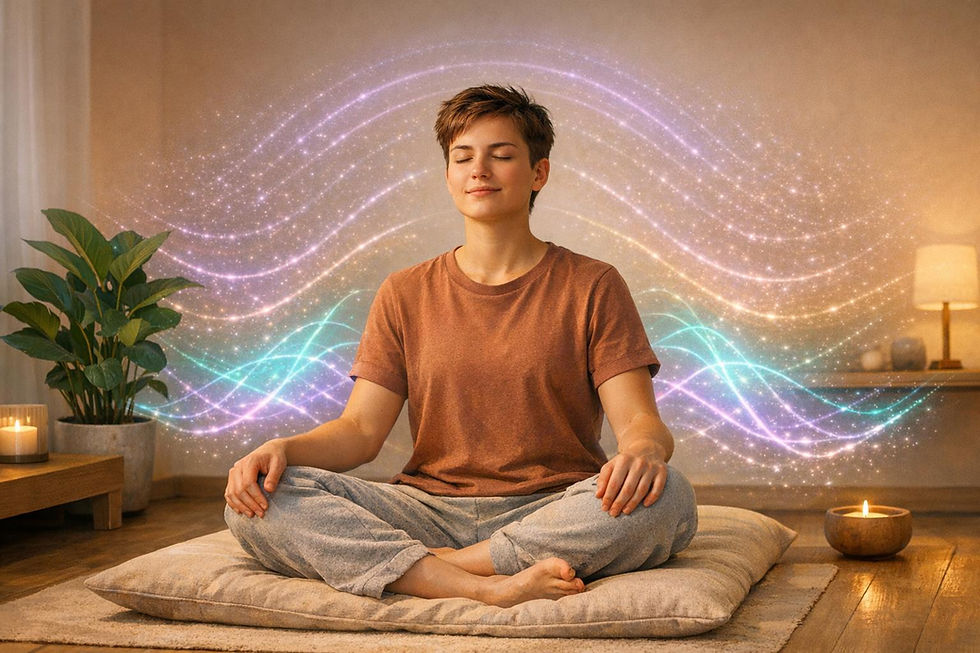Discover the Ultimate 8-Minute Timer with Relaxing Music for Instant Calm
- Sophia Evershine

- Feb 13, 2025
- 10 min read
Ever felt like you just need a quick escape from the chaos of life? An 8-minute timer with relaxing music might be your answer. It's a simple way to find calm in the middle of a busy day. Whether you're at work, home, or anywhere in between, these short bursts of relaxation can make a big difference. Let's dive into how this works and why it's worth a try.
Key Takeaways
An 8-minute timer with relaxing music can provide a quick mental break.
Music has a powerful impact on the brain, helping to reduce stress and improve mood.
Short relaxation sessions are effective and easy to fit into a busy schedule.
Choosing the right music and setting can enhance the relaxation experience.
Consistency in using relaxation techniques can lead to better mental health.
The Science Behind Relaxation and Music
How Music Affects the Brain
Music has this magical ability to influence our brain in ways that are both fascinating and beneficial. When you listen to music, especially calming tunes, your brain releases dopamine, that feel-good chemical. This is why you might find yourself smiling or tapping your foot to a beat. Music can also lower cortisol levels, which is the hormone responsible for stress. This means that just by listening, you can actually reduce stress and anxiety. It's like having a personal therapist in your headphones!
The Role of Rhythm in Relaxation
Rhythm plays a huge part in how music affects us. Think about a slow, steady beat—it's calming, right? That's because our brains naturally sync up with the rhythm, a phenomenon known as "entrainment." This syncing helps slow down our heart rate and breathing, leading to a relaxed state. It's why lullabies are so effective for babies and why certain rhythms can make us feel at ease. So, next time you're stressed, try listening to something with a gentle, consistent rhythm.
Benefits of Short Relaxation Sessions
You don't need hours to feel the benefits of relaxation. Short sessions, like an 8-minute timer with 432 Hz music, can do wonders. These brief moments of calm can improve your mood, increase focus, and even boost your immune system. Plus, they're easy to fit into your day. Whether it's a quick break at work or a moment of peace before bed, these short bursts of relaxation can help reset your mind and body, making you feel refreshed and ready to tackle whatever comes next.
Creating the Perfect 8-Minute Timer Experience
Choosing the Right Music for Relaxation
Selecting the right music sets the tone for a calming experience. Music with a slow tempo and no sudden changes can help your mind unwind. Consider genres like ambient, soft piano, or even nature-inspired tracks. These can create a soothing backdrop for your timer. Experiment with different styles until you find the one that resonates with you.
Setting Up Your Environment for Calm
Creating a peaceful environment is just as important as the music itself. Dim the lights, find a comfortable seat, and eliminate distractions. A cozy blanket or a favorite pillow can enhance your relaxation session. This environment helps your mind associate the timer with tranquility.
The Importance of Consistency in Relaxation
Consistency is key to building a habit of relaxation. Try to set aside the same time each day for your 8-minute break. Whether it's a morning ritual or an afternoon pause, making it a regular part of your routine can improve your overall well-being. Over time, your mind will begin to anticipate and enjoy these moments of calm.
Exploring Different Genres of Relaxing Music
Classical Tunes for Tranquility
Classical music has been a go-to for relaxation for centuries, offering a sense of calm and peace through its structured compositions and soothing melodies. Whether it's the gentle flow of a piano sonata or the sweeping strings of a symphony, classical tunes can create a serene atmosphere that's perfect for unwinding. Many studies indicate that classical music can significantly alleviate stress, making it an effective tool for relaxation and mental well-being. Classical music has been shown to create a calming atmosphere, helping to reduce anxiety and promote a sense of tranquility.
Nature Sounds and Their Calming Effects
Nature sounds, like the gentle patter of rain or the soft rustling of leaves, have a unique way of connecting us to the earth. These sounds can transport you to a peaceful forest or a calm beach, even if you're sitting in your living room. The natural rhythms and tones of nature sounds are often used in meditation and relaxation practices to help ground and center the mind. They are especially effective for those who find traditional music distracting.
Modern Ambient Music for Relaxation
Modern ambient music is like a warm hug for your ears. It's all about creating a soundscape that feels both expansive and intimate, using synthesizers, soft beats, and echoing effects to craft a relaxing experience. This genre is perfect for those who enjoy a more contemporary sound but still want the calming benefits of music. Ambient music can be particularly effective for background listening during activities like reading or working, where a gentle, unobtrusive soundtrack is needed.
Exploring different genres of relaxing music can open up new pathways to finding your personal sense of calm. Whether it's the structured elegance of classical music, the organic sounds of nature, or the innovative vibes of ambient tunes, there's a world of soothing sounds waiting to be discovered.
Incorporating Relaxation into Your Daily Routine
Morning Relaxation Techniques
Starting your day with a bit of calm can set the tone for everything that follows. Try waking up a little earlier to enjoy some peaceful moments. A few minutes of meditation or deep breathing in the morning can work wonders. You might also consider listening to relaxing music 528 Hz to gently ease into the day. This frequency is known for promoting relaxation and stress relief, making it a great addition to your morning routine.
Midday Calm: Taking a Break
The middle of the day can be hectic, but taking a break is essential. Step away from your work and find a quiet spot. Close your eyes and focus on your breathing. A quick 5-minute meditation session or listening to calming music can recharge your mind. Here’s a simple checklist:
Find a quiet space.
Close your eyes and breathe deeply.
Play some soothing music or nature sounds.
Evening Wind Down with Music
As the day winds down, it's time to relax and prepare for a restful night. Create a calming evening ritual by dimming the lights and playing soft music. This is the perfect time to incorporate the 528 Hz frequency again, helping you to unwind after a long day. Consider pairing this with a warm bath or some gentle stretching to further promote relaxation.
Incorporating relaxation into your daily routine doesn't have to be complicated. It's about finding small moments throughout the day where you can pause, breathe, and reset. Over time, these little practices can lead to a more balanced and peaceful life.
The Impact of Relaxation on Mental Health
Reducing Stress Through Music
Ever had one of those days where everything feels like it's piling up? Yeah, stress can do that to you. But here's the thing: music can help. When you listen to calming tunes, your body starts to relax, and stress levels drop. It's like your brain gets a mini-vacation. You know that feeling when a great song comes on, and you just breathe a little easier? That's what we're talking about.
Enhancing Focus and Concentration
Trying to concentrate in today's world is like juggling flaming swords. But music can be your secret weapon. Certain types of music, like classical or ambient, can help you zero in on tasks. It creates this sort of "focus bubble" around you. Next time you're studying or working, try putting on some instrumental tracks and see if it helps you keep distractions at bay.
Improving Sleep Quality with Relaxation
We've all had those nights where sleep just won't come. It's frustrating, right? Listening to soothing music before bed can change that. It signals to your brain that it's time to wind down. Think of it as a lullaby for adults. This habit can improve your sleep quality over time, helping you wake up feeling more refreshed.
Incorporating relaxing music into your daily routine can be a simple yet effective way to improve your mental health. Whether you're reducing stress, enhancing focus, or improving sleep, the right music can make a difference.
And hey, if you're looking for more relaxation tips to alleviate stress and worry, like breathing exercises or spending time in nature, there are plenty of options out there to explore. It's all about finding what works best for you.
The Art of Mindful Listening
Focusing on the Present Moment
Mindful listening is all about tuning into the now. It's about really hearing what's happening around and within you. When you listen mindfully, you're not just hearing sounds; you're fully present. This means letting go of distractions and giving your full attention to the experience of listening. Imagine sitting quietly, focusing on each note of music or every rustle of leaves. It's a simple yet powerful way to ground yourself in the present.
Deep Breathing and Music
Pairing deep breathing with music can elevate your relaxation practice. As you listen to calming tunes, try slow, deep breaths. Inhale through your nose, hold it for a moment, then exhale gently through your mouth. This breathing technique, combined with soothing music, can help you enter a state of calmness. It's like giving your mind a mini-vacation, a break from the hustle and bustle of life.
Mindful Music Practices for Beginners
Starting with mindful music practices doesn't have to be complicated. Here’s a simple guide to get you going:
Choose Your Music: Pick something that resonates with you, like Relax Hz music, which is known to promote emotional balance.
Find a Quiet Spot: Make sure you're in a place where you won't be disturbed. It could be a cozy corner of your room or a peaceful spot in a park.
Use Headphones: They can help you focus more on the music and less on external noises.
Set a Timer: Start with just 5 to 10 minutes. You don't need to spend hours; even a short session can be beneficial.
Reflect: After listening, take a moment to reflect on how you feel. Notice any changes in your mood or thoughts.
Mindful listening isn't just about the music; it's about creating a moment of peace in your day. It's a practice that, over time, can bring more awareness and tranquility into your life.
Technology and Relaxation: Tools for a Calmer Life
Apps for Relaxation and Meditation
In today's fast-paced world, apps can be a real lifesaver for finding a bit of peace. They offer guided meditations, calming soundscapes, and even track your stress levels. Some top picks include Headspace and Calm, which provide various features to help you unwind. These apps make it easy to fit relaxation into your busy schedule.
Using Smart Devices for Relaxation
Smart devices have taken relaxation to a new level. From smart speakers that play soothing music like 432 Hz Sleep Music to wearable tech that monitors your breathing, these devices are making it easier to relax. You can set up routines that automatically dim lights, play calming tunes, and even start a guided meditation session.
The Future of Relaxation Technology
The future holds exciting possibilities for relaxation tech. We might see more integration of AI to personalize relaxation experiences. Imagine a device that knows your mood and adjusts the environment accordingly. As tech advances, our ability to find calm will only get better.
Embracing technology in our quest for relaxation doesn't mean losing the personal touch. It's about finding ways to make relaxation more accessible and effective in our daily lives.
Personalizing Your Relaxation Experience
Creating a relaxation routine that's all about you can make a world of difference in achieving a state of calm. When you customize your relaxation experience, you're more likely to stick with it and reap the benefits. Here's how you can tailor your relaxation sessions to fit your unique style and preferences.
Tailoring Music to Your Mood
Music has a powerful impact on our emotions, and choosing the right tunes can enhance your relaxation. Consider these steps:
Identify Your Preferences: Do you feel more relaxed with the sound of ocean waves or the strumming of a guitar? Knowing what sounds soothe you is key.
Mix and Match: Combine natural sounds like rain and jazz for a unique, calming experience.
Experiment with Frequencies: Some people find that music tuned to 432 Hz promotes relaxation and improves sleep quality.
Creating a Relaxation Playlist
A well-curated playlist can be your go-to tool for unwinding. Here's how to create one:
Start with Favorites: Include songs that you already know help you relax.
Explore New Genres: Try different types of music, like classical or ambient, to see what works best.
Update Regularly: Keep your playlist fresh by adding new tracks that you discover.
Experimenting with Different Relaxation Techniques
Finding the right relaxation technique can be as personal as choosing your favorite music. Here are some ideas:
Mindful Listening: Focus on the music and let it guide your breathing and thoughts.
Guided Meditation: Use apps or recordings that incorporate music to lead you through relaxation exercises.
Progressive Muscle Relaxation: Pair this technique with soothing music to help ease tension in your body.
Personalizing your relaxation routine isn't just about picking the right music. It's about creating a space and a mindset that invites peace and tranquility into your life. By experimenting and fine-tuning your approach, you can transform your relaxation time into a truly personal retreat.
Wrapping It Up
So, there you have it. An 8-minute timer with soothing music might just be the quick fix you need for a bit of peace in your day. Whether you're winding down after a long day or just need a moment to breathe, this little tool can help you find your calm. It's simple, it's easy, and it fits right into your routine. Give it a try and see how it changes your day. Who knew eight minutes could make such a difference? Try it out and let the music do its magic.
Frequently Asked Questions
What is the best type of music for relaxation?
The best type of music for relaxation varies for each person, but many find classical, nature sounds, or gentle instrumental music to be calming.
How does relaxing music help with stress?
Relaxing music can lower your heart rate and blood pressure, helping to reduce stress and promote a sense of calm.
Can I use relaxing music to help me sleep?
Yes, listening to soothing music before bed can create a peaceful environment that helps you fall asleep faster.
How long should I listen to relaxing music for it to be effective?
Even short sessions of 5 to 10 minutes can be beneficial for reducing stress and promoting relaxation.
Is it okay to listen to relaxing music while studying?
Yes, relaxing music can improve concentration and focus by creating a calm and distraction-free environment.
Do I need special equipment to listen to relaxing music?
No special equipment is needed. You can use any device that plays music, like a phone, computer, or stereo.






Comments